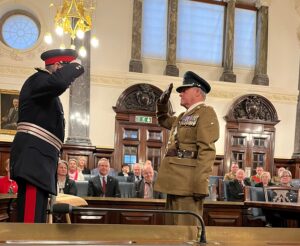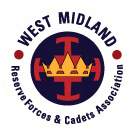During Armed Forces Week we are celebrating the dedication and service of our Armed Forces community. Whilst many personnel have stories to share from serving in a military or volunteer capacity, it’s not often we hear from someone with a wide range of both military and cadet experiences.
We spoke to Captain Kenny Frith who has been a Cadet Administrative Assistant (CAA) for Staffordshire and West Midland (North Sector) Army Cadet Force for nearly 36 years. Kenny also has a combined military history in the Regular Army and Army Reserve of 48 years. Most recently he has received his 4th clasp to the Cadet Forces Medal to mark 30 years of service to the Cadet Forces.
Outside of his role as a CAA Kenny is also a supporter of the Downs Syndrome Association, and a committee member of Scarlet Lancers Aliwal Dinner Branch.
We asked how his military career has shaped his skills – and why supporting the Army Cadets can be a highly rewarding experience.
—–
 Why did you decide to join the Army, and can you tell us a bit about your military career?
Why did you decide to join the Army, and can you tell us a bit about your military career?
I joined the Cadet Forces at the age of 12 before starting my career as an apprentice for Michelin Tyres. After 18 months I decided to join the Army instead, beginning my military career in 1973 with 16th/5th The Queen’s Royal Lancers; an armoured cavalry reconnaissance unit (affiliated to Stoke-on-Trent).
I was mobilised on several occasions and was first posted to Hong Kong for a year. I also spent six years in Germany, was twice mobilised to Northern Ireland and have taken part in exercises in Norway, Portugal, Greece and Denmark.
I was part of NATO’s Exercise Lionheart in Germany which was the biggest British Army exercise and mobilisation since the end of the Second World War, and have also helped to train soldiers for deployment to Afghanistan and Iraq.
How did you make the move from being in the Army to working with the Army Cadets?
After my son was born my regiment was posted back to Tidworth, where I was part of the ACE (Allied Command Europe) Mobile Force (AMF) for four years and also worked in the recruiting office. Whilst at the recruiting office and liaising with the Army Cadet Force, I was offered a job as CAA.
My unit was due to be posted back to Germany for a further 10 years, so I made the decision to leave the Army as my son has special needs, and there were no adequate special needs provisions in Germany at the time.
You also served with the Reserve Forces – did you join straight after your Army career?
I transferred into the Reserve Forces straight from the Army because of my qualifications with my reconnaissance unit, and joined the Queen’s Own Mercian Yeomanry. Following amalgamation this then became the Royal Mercian and Lancastrian Yeomanry, then the Royal Yeomanry.
I commissioned in 2008 and served for 32 years in the Reserves, before finishing my career as a Training Captain with the Royal Yeomanry in Dawley Bank, Telford.
Are there any particular highlights from your Reservist career?
In the Reserve Forces I received the Chief of Staff’s Commendation. I have also taken part in exercises in Germany and the Ascension Islands.
Are you able to use skills you learnt in the Army and Reserve Forces in your job with the Cadet Forces?
Yes, definitely. There’s a huge amount of transferable skills which the military teaches you – organisation, leadership etc – which are used daily in my role with the cadets. The skills you learn lend themselves well to jobs in society and the community.
Can you explain what your role with Staffordshire and West Midlands Army Cadet Force involves?
As a CAA I work within the Quarter Master’s department providing facilities support for cadet units. Whilst I work primarily during the daytime, on evenings, weekends and annual camps I can be helping to provide logistics support at units or helping to feed the cadets on camps, ensuring health and safety compliance and undertaking general transportation and supply tasks.
What benefits does the Army Cadet Force bring to young people?
The reward is seeing the cadets thrive. It’s great, it’s been such an experience. I have watched so many cadets transition from becoming shy young individuals to becoming confident, articulate and determined young adults over the past 30 years.
We encounter many young people from deprived backgrounds who find their family in the Army Cadet Force. The Army Cadet Force offers an incredible life experience for them, and it’s affordable cost wise. We provide DofE qualifications, camping opportunities, fieldcraft, sports, music, first aid – and equip our young people with the skills they need to retain information long after they have finished their cadet experience. This gives them the skills ready to help make life decisions for their future career choices.
The impact on our local communities is great. The Army Cadets is not all about the cadet training syllabus, a large part of our activities are also community based. The detachments I work with all take part in volunteering or community initiatives. For example, they’ve helped out with car parking at local bonfires, and at community fun days and charity events.
By improving relationships with our local community networks it brings more opportunities for everyone. You’re also meeting new people, gaining knowledge and both the cadets and adults are giving something back to the community.
Why would you recommend volunteering with the Army Cadets to others?
Joining a youth organisation is a brilliant way to give the young people in our communities a chance to develop themselves. For cadets to see a potential adult who is smart, well turned out and with a caring attitude – it is a great start to setting them a positive example.
We provide all of the training you need, potential volunteers do not need any prior experience or particular skills.
You also get so much out of it yourself as a volunteer. We can arrange for volunteers to take part in courses to become trained in mountain biking, adventure training, first aid and a whole host of qualifications which can help you upskill.
Jobs are rarely a job for life, so the transferable skills you gain can give you the extra skills to find and attract new roles and opportunities.
Staffordshire Army Cadet Force is home to over 1200 cadets, supported by 200 adult volunteers in 38 detachments across their county.
Learn more about the role of volunteers in the Cadet Forces.
Published 22/06/2023

